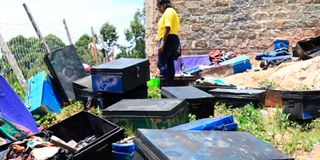For burning schools, children can be held criminally liable

A woman inspects burnt boxes on February 16, 2021 after a dorm fire at Weru Integrated Secondary School in Nyeri. Children should know that a crime once committed can’t be undone.
School has, for ages, been deemed a safe haven for children. Not so anymore, what with the illegal incidents and threats perpetrated by teachers and children, including brazen acts of pupils assaulting tutors.
In light of recent incidents like rape, fatal injuries from corporal punishment, disappearance of students as well as numerous strikes, assaults and arson, and with several trials of students due to school unrest lined up, this tide of lawlessness should be stopped. Caregivers have fallen short of the Geneva Declaration on the Rights of the Child. It would be a justified cause for tantrums to move from a rosy cradle to a school saddle with rules and routine. But that is no justification for a child to commit a crime.
The Constitution provides that a child should not be detained, except as a last resort, and, if so, held for the shortest time possible, separate from adults and in conditions that take account of their sex and age. It also stipulates that a child’s best interests are paramount in every matter concerning them.
Juvenile justice
For a crime to be validly proven, the prosecution must determine and a link a criminal act or omission and malicious motive beyond a reasonable doubt. In juvenile justice, the minor’s age is fundamental. Capacity is not an element of criminal liability, but is part of the culpability; a person who lacks capacity is capable of committing an unlawful act.
The Penal Code places criminal liability at age eight, though it’s 12 in most international laws. The UN Standard Minimum Rules for Administration of Juvenile Justice Rule 4.1 states that the age for criminal liability ought not to be too low, considering the mental and intellectual faculty development of the child. If a child under eight ‘commits a crime’, they cannot be held responsible for it. Commendably, the Sexual Offences Act places liability to sexual and carnal knowledge offences at 12 years.
Legal excuse
The doctrine of doli incapax applies age as a legal excuse to committing a crime. But that is rebuttable if prosecution established that an 8-to-12-year-old understood the consequences of the act or omission. Section 14(2) of the Children Act gives validity to doli incapax, setting criminal liability age at 12.
Children’s Courts, established under the Children Act, are mandated to hear charges against children — except on murder or where a child is charged with an adult(s). But for grave crimes like murder, arson, malicious damage to property, assault with intent to injure, disturbing public tranquility knowingly planned and committed by children 12 and older, they can be tried in other courts as adults.
Children should know that a crime once committed can’t be undone. Suspicious children should be isolated from the mainstream to receive special guidance, education and care. Juveniles are more capable of change than are adults and their actions less likely to be evidence of “irretrievably depraved character”.
Children, think twice before you strike that match.
Mr Ayuo is a legal researcher and tutor. [email protected].





